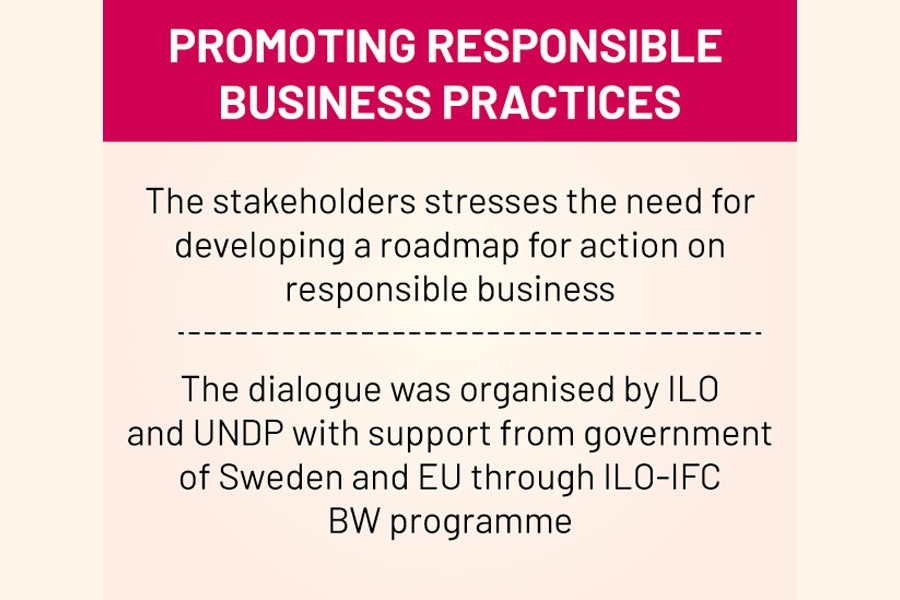
Published :
Updated :

Lack of knowledge about the linkage between responsible business conduct (RBC) and their connections to Sustainable Development Goals (SDGs) is considered to be the major challenge towards promoting responsible business practices in Bangladesh.
Moreover, power imbalance among stakeholders and the lack of policy coordination are other challenges that hinder responsible business practices in the country.
Despite progress, the country continues to face issues such as business-related rights abuses and barriers to effective remedy.
The observations came at a national-level dialogue held on Thursday at a city hotel where leaders and representatives from businesses, government, civil society, workers' organisations and other actors joined to discuss strategies to promote RBC in Bangladesh.
The stakeholders stressed the need for developing a roadmap for action on responsible business and identifying what roles different actors can play to promote corporate responsibility in line with international standards like the UN Guiding Principles on Business and Human Rights (UNGPs).
As the country is scheduled to be graduated from the least developed country (LDC) status in 2026, it would lose preferential market access including that of the EU and on the other hand a growing number of leading economies are adopting mandatory human rights due diligence (HRDD) legislation, they said.
The promotion of RBC and the implementation of the UNGPs will help Bangladesh address these issues and ensure a smooth graduation and continued sustainable development, they added.
The dialogue was organised by the International Labour Organization (ILO) and United Nations Development Programme (UNDP) with support from the government of Sweden and the European Union through ILO-IFC Better Work Bangladesh (BWB) programme.
This dialogue was the culmination of the Bangladesh Business and Human Rights Week held from February 25 to March 1. During the week, a series of workshops took place, engaging different actors to reflect on the progress, pertinent challenges, and opportunities of RBC in Bangladesh.
Addressing the dialogue, Bangladesh Investment Development Authority Director Md Ariful Hoque said, "Bangladesh will soon become a trillion-dollar economy, and the government is committed to ensuring an institutional regime conducive to responsible business."
"Compliance with the UNGPs would ensure an inclusive and resilient LDC graduation."
UN Working Group on Business and Human Rights and Member for Asia and the Pacific Chairperson, Pichamon Yeophantong, said, "The UNGPs represent a collective good, and all stakeholders are set to gain from their implementation."
"A sound, stable economy will help the government attract investment, they provide businesses with a guide of what they need to do, and they ensure the basic rights of people and the environment are respected and protected," she added.
Stephan Liller, Resident Representative of UNDP Bangladesh, said, "As Bangladesh prepares for LDC graduation and upcoming mandatory human rights due diligence laws, the UNGPs provide guidance for states and businesses to play their part in protecting, respecting and remediating business-related human rights violations."
He assured of UNDP's commitment to support efforts to implement these standards in Bangladesh and across Asia.
Speaking on the occasion, Tuomo Poutiainen, ILO Country Director in Bangladesh, said, "The government, employers and workers' organisations in Bangladesh have been successfully advancing labour reforms and promoting responsible business and decent work for all."
"ILO is committed to continue to support this work, which will protect Bangladesh's hard earned economic growth and lead towards the achievement of the SDGs."
Speakers at the event noted that Bangladesh should make greater efforts to promote business and human rights to ensure the long-term growth of export-oriented industries - not only the ready-made-garments sector, but all industries - the vital engines of the economy.
Many European countries are adopting legislation on mandatory human rights due diligence, which would require businesses of a certain size to identify, prevent and mitigate the adverse impacts of their operations on human rights, labour rights, and the environment.
Since three-quarters of Bangladesh's exports are targeted for European markets, businesses in these nations will be required to demonstrate due diligence measures in their supply chains. Similar legislation and measures are being taken by other trading partners, they added.
Speaking at a plenary session, Dr Surya Deva, director of the Center for Environment and Law at Macquarie University, Australia, identified three challenges - limited knowledge about RBC and its impact, lack of policy coordination and power imbalance between importing countries like EU-Bangladesh, buyers-suppliers, companies-workers towards integrating RBC across all stakeholders in Bangladesh.
Citing the discussion that took place at the dialogue, he said there is limited understanding about the linkages between RBC standards at global and local level and how they are connected to sustainable development goals.
munni_fe@yahoo.com


 For all latest news, follow The Financial Express Google News channel.
For all latest news, follow The Financial Express Google News channel.